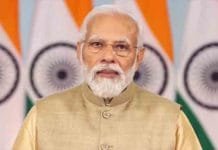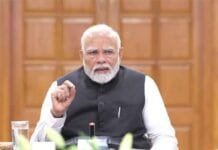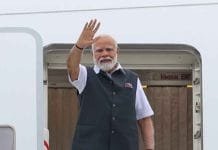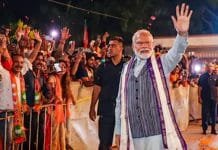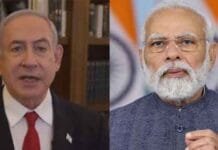Prime Minister Narendra Modi has returned to India after a historic and high-impact eight-day diplomatic tour covering Ghana, Trinidad and Tobago, Argentina, Brazil, and Namibia. The visit, filled with high-level summits, state honors, and major bilateral agreements, reflects India’s growing global footprint and its expanding strategic partnerships across continents. PM Modi’s engagements ranged from receiving top national honors to signing pivotal deals spanning defense, technology, trade, and cultural cooperation.
Historic Reception in Ghana: A Diplomatic Revival After Three Decades
Date of Visit: July 2, 2025
Key City: Accra
Prime Minister Modi commenced his tour in Ghana, marking the first Indian prime ministerial visit in over 30 years. The Ghanaian government welcomed him with state honors and conferred upon him the ‘Officer of the Order of the Star of Ghana’, the country’s highest civilian accolade.
In a powerful address to the Parliament of Ghana, PM Modi emphasized India’s intent to reinvigorate Africa-India partnerships. Discussions covered agriculture modernization, renewable energy, digital infrastructure, and skill development. This visit sets the stage for deeper engagement between India and West Africa’s rapidly growing economies.
Strategic Depth in the Caribbean: Six Key Agreements with Trinidad and Tobago
Key City: Port of Spain
In the second leg, PM Modi landed in Trinidad and Tobago, where he was received with ceremonial grandeur. President Christine Kangaloo awarded him the ‘Order of the Republic of Trinidad and Tobago’, recognizing India’s role in strengthening bilateral ties.
Six major Memoranda of Understanding (MoUs) were signed covering:
Infrastructure development
Pharmaceutical cooperation
Defense and maritime security
Digital transformation
Education exchange programs
Sustainable agriculture initiatives
The meeting with Prime Minister Kamala Persad-Bissessar also included comprehensive discussions on regional stability, trade routes, and the Indian diaspora’s contribution in the Caribbean.
Robust Engagements in Argentina: Celebrating 75 Years of Diplomatic Ties
Key City: Buenos Aires
PM Modi’s visit to Argentina marked the third destination of his global itinerary. In a grand reception hosted by President Javier Milei, both leaders commemorated 75 years of India-Argentina diplomatic relations and reviewed progress under the strategic partnership signed five years ago.
Key moments included:
Roundtable with Argentine business leaders to boost bilateral trade in agri-tech, clean energy, and IT.
Cultural exchange ceremony celebrating shared heritage and Indo-Latin music fusion.
A surprise meeting with Argentine football icons, underscoring India’s rising sports diplomacy.
The two nations agreed to deepen defense coordination and create a new technology transfer channel to foster innovation in clean energy and space research.
India at the Global Stage: PM Modi’s Impact at the 17th BRICS Summit in Brazil
Key City: Rio de Janeiro
During his four-day stay in Brazil, PM Modi participated in the 17th BRICS Summit, which saw high-level discussions on global challenges. In his keynote speech, PM Modi called for urgent reforms in global institutions, citing their inadequacy in addressing 21st-century challenges such as:
Global terrorism
Digital threats
Ongoing international conflicts
Public health infrastructure gaps
Economic inequalities
India’s call for a reimagined multilateralism was endorsed by several leaders, paving the way for a BRICS+ expansion dialogue. India’s push for a common cryptocurrency framework and AI governance also found resonance in summit talks.
State Visit to Brasilia: Strengthening Bilateral Ties with Brazil
Key City: Brasilia
After the BRICS Summit, PM Modi proceeded to Brasilia for a state visit. He was welcomed by President Luiz Inácio Lula da Silva and awarded Brazil’s highest civilian honor, the ‘Grand Collar of the National Order of the Southern Cross’.
Major MoUs signed include:
Boosting bilateral trade to $25 billion by 2030
Joint cooperation in space and satellite communication
Technology exchange in green hydrogen and EV ecosystems
Creation of an Indo-Brazilian Cultural Dialogue Forum
Collaboration on AI ethics and regulation frameworks
This visit reinforced India’s position as a preferred partner in Latin America, particularly in the spheres of sustainability, tech, and agribusiness.
Final Stop in Namibia: A Vision for Africa-India Synergy
Key City: Windhoek
PM Modi concluded his tour with a transformative stop in Namibia, where he was greeted by President Dr. Netumbo Nandi-Ndaitwah. He received Namibia’s highest civilian honor, the ‘Order of the Most Ancient Welwitschia Mirabilis’, symbolizing Namibia’s respect for India’s global leadership.
The two leaders signed a series of forward-looking agreements covering:
Renewable energy capacity building
Defense manufacturing collaboration
Water management and desalination projects
Wildlife and biodiversity conservation
Youth and skills development programs
In his address to the Namibian Parliament, PM Modi emphasized the symbolic value of Namibia’s national bird—the African Fish Eagle—as a reminder of how both nations can soar higher, together, into a future of shared opportunities.
Key Takeaways from PM Modi’s 8-Day, 5-Nation Diplomatic Blitz
Three civilian honors conferred upon PM Modi (Ghana, Trinidad & Tobago, Brazil, and Namibia).
17+ major MoUs signed across five countries.
Successful advocacy for global institutional reforms at the BRICS Summit.
Unprecedented outreach to Latin America and Africa.
Strengthening of South-South cooperation through sustainable and tech-centric agreements.
A Global Strategy with a Local Impact
PM Modi’s eight-day international campaign was not just a ceremonial tour—it was a strategic display of India’s rising geopolitical clout. From energy diplomacy in Africa to tech and trade deals in Latin America, the visit reflected a robust, multi-pronged foreign policy approach.
As India eyes a more active role in shaping the global order, this tour serves as a milestone in recalibrating bilateral and multilateral ties—anchored in mutual respect, economic synergy, and cultural solidarity.




